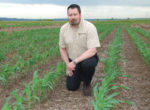Advertise Follow Us
Items Tagged with 'Success'
ARTICLES
25 Years Of Unlocking Secrets To No-Till Success
Since 1988, the Graves-Chapple Research Center has been helping no-tillers in northwestern Missouri fine-tune their corn-and soybean system management and farm their no-tilled acres more sustainably.
Read More
Promise Is Showing With Sequential Fungicide Applications
University and onfarm research is finding a one-two punch of fungicides is resulting in healthier plants and higher yields.
Read More
No-Till Notes
Locate, Correct Compaction For More No-Till Success
Like any field operation, identifying and addressing compaction layers are important to maximize water infiltration, root growth and crop yields.
Read More
What I've Learned from No-Tilling
Balanced Soil Is The Base For Strip-Till Success
When making farm-management decisions, second-generation strip-tiller Bill Darrington considers the impact on soil life and structure from every angle.
Read More
Perfecting And Expanding A Mature No-Till System
Building on his father’s no-till success, Kevin Trunnell is improving herbicide programs and reducing tillage in vegetable production.
Read More
Two Legends Who Gave No-Till A Lift
A savvy for problem solving helped two rural Kentucky farmers invent planter attachments and technologies that changed the game for no-tillers.
Read More
Overcoming The Myths Holding Back No-Till
If you’re going to be successful in transitioning to no-till, you must avoid these numerous no-till farming fallacies.
Read More









